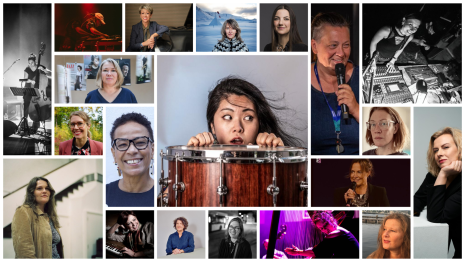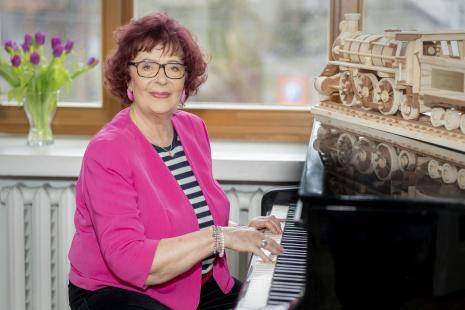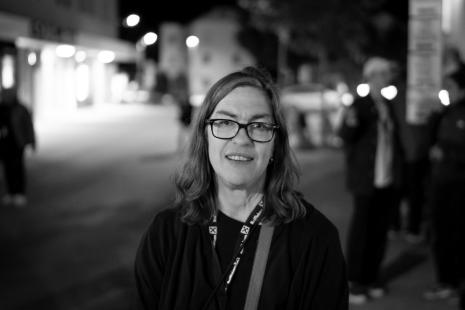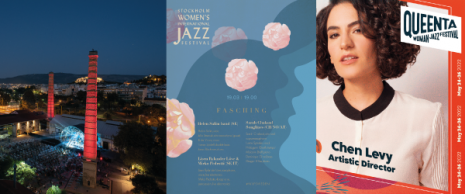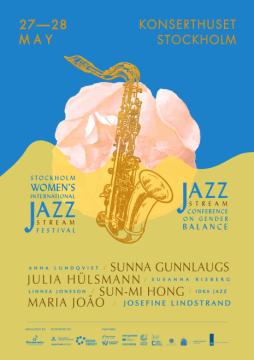Back to list
#WomenToTheFore 6: Pelin Opcin
We talked to Pelin Opcin, Director of Programming at Serious. Pelin programmes live cultural experiences including the flagship EFG London Jazz Festival.
How would you describe the role of programmer and festival director?
I feel that I'm a facilitator, opening up a platform for artists. And my work also embodies lots of curatorship, creativity and organisational skills.
At the end of the day, we are not gatekeepers. We are gate openers. It is the artists who are creating the work, and we help them to find the right platform. Programming is about joining these dots and facilitating the right medium for artists so that they can reach their audiences.
We are the ones catalysing that interaction. Making sure the artists reach their own goals and also have access to our resources and knowledge.
How did your interest in music develop and what were your first steps into a career as a programmer?
I always loved music but I had other interests as well. I studied Molecular Biology and Genetics at Bogazici University in Istanbul. I was so curious for knowledge. But I think my love for music and my appetite for being in artistic and social surroundings overcame my interest in science in the end.
I grew up in a musical family and I sang in choirs, but I always knew my role wasn't to be on stage but to help make things happen. At university, we set up a radio station at a time when it was difficult - and not always legal. I was raising funds, producing a programme, coordinating with the board and organising lots of external events.
I was trying to work out whether to continue my studies in science after my degree - I worked on a big research project and it was quite lonely in the lab - or if there was a way to work in the music business.
I'd been going to the Istanbul Festival since I was 13 and it had recently split into different festivals for different genres. The cultural offering in Turkey in the 90s was developing but relatively limited. I saw all these young people with access passes working behind the scenes and to me it was like they were heavenly creatures or something!
I managed to get a job as a driver for them - in shirt and tie - and also did lots of paperwork in the office.
As I finished my studies, the director of the Istanbul Jazz Festival told me he was looking for an assistant and asked me to apply. I worked really hard and was also lucky. In the end I became the Assistant Director, and eventually the Director of the Istanbul Jazz Festival.
Did you have any role models or mentors that inspired or supported you?
My first employer was the Istanbul Foundation for Culture and Arts and it had such a lovely working climate - from most experienced leaders to newcomers into the scene, it was like a school. They all inspired me. And my previous directors at Serious, I've learnt a lot from all three of them.
There are lots of artists who inspired me too - in the way they look after their musicians and staff. And of course I’m inspired by the jazz musicians and industry people I work with internationally. I’m connected with a network of 17 festivals, which led me to EJN. Everyone brings different strengths and knowledge to share and I can give back some of my learning and skills too.
You’ve led the programming of jazz festivals in both Istanbul and London. What key learnings or perspectives did you bring from your role at Istanbul Jazz Festival to London, and what have you done differently at EFG London Jazz Festival?
My main learning is to be responsive to different scenarios. I developed a good sense of adapting to changing circumstances because Turkey is a completely different ballgame in terms of the social, political and economic situation, with lots of changes and challenges.
So you’ve got to respond to that and still stay afloat and make the festival survive. Then when I came to London, there was Covid. So this set of skills really helped me to navigate that.
When it comes to programming, we didn't have the venue infrastructure in Istanbul that London has. So we had to turn a lot of outdoor spaces into concert spaces.
This means that I’m always thinking about how we can enhance the audience experience, not necessarily replicating their regular concert experience in formal venue settings, but creating different locations to experience music.
For example, we worked in Royal Docks Compressor House and my creative engagement colleagues have developed fantastic programmes in Barking using different spaces. I used to do a jazz boat gig in Istanbul, and in London we did some mini gigs on the Thames Clipper service during the festival.
For me, everything needs to be festival specific though. You cannot just repeat things that are happening in the London scene already. You need to think about the right combination of main stage artists and younger talent, and how we can be a catalyst and open the door to emerging artists. I can be a fresh pair of eyes for this while also building on everything that has come before.
There have been some really exciting projects, for example working with Black British artists to mark the 70th Anniversary of Windrush in 2018 - curating new and multidisciplinary works. These are the projects I really want to make happen, with the help of my colleagues.
EFG London Jazz Festival has an interesting model as a 'decentralised' festival. You work for Serious, the music production & promotion company that organises the festival and programmes key events. Other venues in London programme jazz during the same period and these are all marketed under the London Jazz Festival umbrella, ensuring that London, a huge city, is filled with jazz. What do you find the strengths and challenges of this model?
One of the obvious strengths is that it's an amazing celebration of jazz and all that the UK and London has to offer, and it also brings international attention and international artists. So it's the zenith of the year and we also help drive even more audiences to the clubs and venues - it's such a bonding moment with the rest of the musical community.
And, I think, 10 days of a musical marathon, gives us the opportunity to invite as many artists as possible. There’s a level of logistic flexibility. If the date or venue doesn't work, we’ve got something else we can offer.
The challenge is that it’s a massive programme so we compete with ourselves in a way. We try to make the audience's experience as good as possible, so they can see multiple shows over a weekend, and navigate the programme easily. But we do accept there will be FOMO - when you are doing one thing, you're going to miss the other and this is the nature of the programme. It's very intense!
For such a big metropolis, I think we do a great job. In a huge city it can be harder to have focal moments, but we have a loyal audience and I think there’s a sense that the city owns the festival and this helps put it front and centre. It’s one of the mega moments in London’s calendar. It helps to have great media partners like BBC Radio 3 and our sponsor EFG is supporting us to spread our word far and wide.
How would you describe the role of programmer and festival director?
I feel that I'm a facilitator, opening up a platform for artists. And my work also embodies lots of curatorship, creativity and organisational skills.
At the end of the day, we are not gatekeepers. We are gate openers. It is the artists who are creating the work, and we help them to find the right platform. Programming is about joining these dots and facilitating the right medium for artists so that they can reach their audiences.
We are the ones catalysing that interaction. Making sure the artists reach their own goals and also have access to our resources and knowledge.
How did your interest in music develop and what were your first steps into a career as a programmer?
I always loved music but I had other interests as well. I studied Molecular Biology and Genetics at Bogazici University in Istanbul. I was so curious for knowledge. But I think my love for music and my appetite for being in artistic and social surroundings overcame my interest in science in the end.
I grew up in a musical family and I sang in choirs, but I always knew my role wasn't to be on stage but to help make things happen. At university, we set up a radio station at a time when it was difficult - and not always legal. I was raising funds, producing a programme, coordinating with the board and organising lots of external events.
I was trying to work out whether to continue my studies in science after my degree - I worked on a big research project and it was quite lonely in the lab - or if there was a way to work in the music business.
I'd been going to the Istanbul Festival since I was 13 and it had recently split into different festivals for different genres. The cultural offering in Turkey in the 90s was developing but relatively limited. I saw all these young people with access passes working behind the scenes and to me it was like they were heavenly creatures or something!
I managed to get a job as a driver for them - in shirt and tie - and also did lots of paperwork in the office.
As I finished my studies, the director of the Istanbul Jazz Festival told me he was looking for an assistant and asked me to apply. I worked really hard and was also lucky. In the end I became the Assistant Director, and eventually the Director of the Istanbul Jazz Festival.
Did you have any role models or mentors that inspired or supported you?
My first employer was the Istanbul Foundation for Culture and Arts and it had such a lovely working climate - from most experienced leaders to newcomers into the scene, it was like a school. They all inspired me. And my previous directors at Serious, I've learnt a lot from all three of them.
There are lots of artists who inspired me too - in the way they look after their musicians and staff. And of course I’m inspired by the jazz musicians and industry people I work with internationally. I’m connected with a network of 17 festivals, which led me to EJN. Everyone brings different strengths and knowledge to share and I can give back some of my learning and skills too.
You’ve led the programming of jazz festivals in both Istanbul and London. What key learnings or perspectives did you bring from your role at Istanbul Jazz Festival to London, and what have you done differently at EFG London Jazz Festival?
My main learning is to be responsive to different scenarios. I developed a good sense of adapting to changing circumstances because Turkey is a completely different ballgame in terms of the social, political and economic situation, with lots of changes and challenges.
So you’ve got to respond to that and still stay afloat and make the festival survive. Then when I came to London, there was Covid. So this set of skills really helped me to navigate that.
When it comes to programming, we didn't have the venue infrastructure in Istanbul that London has. So we had to turn a lot of outdoor spaces into concert spaces.
This means that I’m always thinking about how we can enhance the audience experience, not necessarily replicating their regular concert experience in formal venue settings, but creating different locations to experience music.
For example, we worked in Royal Docks Compressor House and my creative engagement colleagues have developed fantastic programmes in Barking using different spaces. I used to do a jazz boat gig in Istanbul, and in London we did some mini gigs on the Thames Clipper service during the festival.
For me, everything needs to be festival specific though. You cannot just repeat things that are happening in the London scene already. You need to think about the right combination of main stage artists and younger talent, and how we can be a catalyst and open the door to emerging artists. I can be a fresh pair of eyes for this while also building on everything that has come before.
There have been some really exciting projects, for example working with Black British artists to mark the 70th Anniversary of Windrush in 2018 - curating new and multidisciplinary works. These are the projects I really want to make happen, with the help of my colleagues.
EFG London Jazz Festival has an interesting model as a 'decentralised' festival. You work for Serious, the music production & promotion company that organises the festival and programmes key events. Other venues in London programme jazz during the same period and these are all marketed under the London Jazz Festival umbrella, ensuring that London, a huge city, is filled with jazz. What do you find the strengths and challenges of this model?
One of the obvious strengths is that it's an amazing celebration of jazz and all that the UK and London has to offer, and it also brings international attention and international artists. So it's the zenith of the year and we also help drive even more audiences to the clubs and venues - it's such a bonding moment with the rest of the musical community.
And, I think, 10 days of a musical marathon, gives us the opportunity to invite as many artists as possible. There’s a level of logistic flexibility. If the date or venue doesn't work, we’ve got something else we can offer.
The challenge is that it’s a massive programme so we compete with ourselves in a way. We try to make the audience's experience as good as possible, so they can see multiple shows over a weekend, and navigate the programme easily. But we do accept there will be FOMO - when you are doing one thing, you're going to miss the other and this is the nature of the programme. It's very intense!
For such a big metropolis, I think we do a great job. In a huge city it can be harder to have focal moments, but we have a loyal audience and I think there’s a sense that the city owns the festival and this helps put it front and centre. It’s one of the mega moments in London’s calendar. It helps to have great media partners like BBC Radio 3 and our sponsor EFG is supporting us to spread our word far and wide.
As an experienced and talented jazz / creative music programmer, what advice or tips would you give a younger person who wants to establish themselves as a successful programmer?
In a nutshell, no job is too big or small and no question is a stupid question.
And even though there are degree courses on cultural and arts management, on the job training is so important. Even musicians, who have fantastic music training through conservatoires, need some professional skill training to build their careers. Our Take Five talent development programme helps them with these skills.
So if you want to be on this trajectory, start as a volunteer. And then you can start to get paid work backstage or in event production and you will learn the skills, gain the behind the scenes knowledge and meet people.
Remember every single person you meet and keep in contact and value those relationships. I have benefited from being direct and transparent but also careful. Sometimes how you say things are as important as what you say. I’ve always focused on the positives and the potential of relationships and partnerships. Keep being honest and respectful. Artists have put all of their lives in their work and there are moments when you have to say no to their projects - how will you navigate that?
Also, spend time understanding if it’s the right job for you. Because it can be stressful, work-life balance is not always ideal and your work becomes a part of your identity. Most of the time we are expected to be in it for self-actualisation and not for the biggest paycheck. Are you happy to settle with that?
How do you ensure that the EFG London Jazz Festival showcases a diverse range of artists, including established names and emerging talents, while also considering gender balance? Are there any specific challenges you face in achieving this balance?
There must be no challenge, it's not even a question, and there’s no virtue signalling or tokenism. It should be the natural way. There's plenty of amazing talent so I don't see it as a challenge at all in a negative sense. I just see it as an amazing positive opportunity.
What we need to do to develop is to remove even more barriers including thinking about how we can develop our offering for disabled people and different neurodivergent needs.
We also need to consider the environmental impact of what we are doing and how we can offset or improve that. I think these areas are the ones we need to improve, but in terms of diversity, it's our natural fabric. And it's our team's fabric as well. So I am genuinely hoping that it comes naturally.
Women and non-binary people are under-represented in the jazz and creative music sector. What do you think needs to change and are there any initiatives or projects you’d like to highlight that are making a difference?
The change needs to be about equality of opportunity at the very start and it begins with access to music education. And it’s not just about gender balance but also about diversity.
Some encouragement and quota in conservatoires may help but that must also be followed by doing the right things to change the culture; who do the artists choose to team up with, how do the jam sessions run, is there competition or collaboration, how can we change the late night culture and be more inclusive?
How can we break these barriers on the professional side of things? I’ve been very lucky in my professional life, there’s been a good gender balance and this is Turkey. But I still witness a male-dominated music scene, which is now starting to change.
There's more awareness, and so many great women running organisations and doing programming. So it’s definitely improved, and now it's a matter of changing some dynamics in other areas of the industry, including popular and contemporary music.
I am a part of the Concerts Promoters Association as well and they are an amazing group of people doing a fantastic job for keeping the UK as one of the biggest music markets and I hope to see a lot of women there as well.
I’ve always recognised that we have to do double the work to be recognised. You can be outspoken about it and not reconcile to it. I thought this could be a distraction. I chose to stay aware but not to be daunted by it. Waited for the right time to be heard but I don’t want to have to fight. Being outspoken is very necessary to keep it on the agenda and help everyone else.
I also think actions speak louder than words, even though we have to make double or triple the effort. We are not naive. We know we are doing that but we are patient.
EFG London Jazz Festival - and Serious - were founded by the late John Cumming. How do you build on his legacy while also bringing your own unique vision to the festival? What have you learnt about succession and legacy that could help others who are stepping into new roles?
It has been the most wonderful challenge; stepping into such an important role is a huge responsibility. Finding a delicate balance between relying on the existing success and legacy and opening the creative space was my initial approach.
I was in it for the long run and was lucky to have the time and space for not rushing things. I believed in the necessity of a refresh for responding to changing artistic and social climates, but was not into changing things for the sake of change. I had the chance of learning from the best practices but also saw the previous challenges as opportunities. I prioritised building good relationships, believing in the synergy between team members, partners and other similar organisations.
Which artists are you really excited about in this year’s line-up? Who should our members look out for?
I am looking forward to the UK premiere of Wayne Shorter’s Symphonic Music played by an all star ensemble including Esperanza Spalding and Terri Lyne Carrington accompanied by Philharmonia Orchestra. Wayne Shorter’s late career symphonic work is a fruit of his collaborations with Esperanza Spalding and inspired by her voice and words.
There are many other fantastic female artists in the line up whom I’d love to see; Hiromi, Emeli Sande, Samara Joy, Cecile Mc Lorin Salvant, YolanDa Brown, Aynur, Emma Rawicz… and emerging acts such as BINA, and our Take Five alumni Sahra Gure, Midori Jaeger and Johanna Burnheart.
EFG London Jazz Festival takes place from 10-19 November 2023
efglondonjazzfestival.org.uk
Photographer credit:
Photo 2: Tatiana Gorilovsky
In a nutshell, no job is too big or small and no question is a stupid question.
And even though there are degree courses on cultural and arts management, on the job training is so important. Even musicians, who have fantastic music training through conservatoires, need some professional skill training to build their careers. Our Take Five talent development programme helps them with these skills.
So if you want to be on this trajectory, start as a volunteer. And then you can start to get paid work backstage or in event production and you will learn the skills, gain the behind the scenes knowledge and meet people.
Remember every single person you meet and keep in contact and value those relationships. I have benefited from being direct and transparent but also careful. Sometimes how you say things are as important as what you say. I’ve always focused on the positives and the potential of relationships and partnerships. Keep being honest and respectful. Artists have put all of their lives in their work and there are moments when you have to say no to their projects - how will you navigate that?
Also, spend time understanding if it’s the right job for you. Because it can be stressful, work-life balance is not always ideal and your work becomes a part of your identity. Most of the time we are expected to be in it for self-actualisation and not for the biggest paycheck. Are you happy to settle with that?
How do you ensure that the EFG London Jazz Festival showcases a diverse range of artists, including established names and emerging talents, while also considering gender balance? Are there any specific challenges you face in achieving this balance?
There must be no challenge, it's not even a question, and there’s no virtue signalling or tokenism. It should be the natural way. There's plenty of amazing talent so I don't see it as a challenge at all in a negative sense. I just see it as an amazing positive opportunity.
What we need to do to develop is to remove even more barriers including thinking about how we can develop our offering for disabled people and different neurodivergent needs.
We also need to consider the environmental impact of what we are doing and how we can offset or improve that. I think these areas are the ones we need to improve, but in terms of diversity, it's our natural fabric. And it's our team's fabric as well. So I am genuinely hoping that it comes naturally.
Women and non-binary people are under-represented in the jazz and creative music sector. What do you think needs to change and are there any initiatives or projects you’d like to highlight that are making a difference?
The change needs to be about equality of opportunity at the very start and it begins with access to music education. And it’s not just about gender balance but also about diversity.
Some encouragement and quota in conservatoires may help but that must also be followed by doing the right things to change the culture; who do the artists choose to team up with, how do the jam sessions run, is there competition or collaboration, how can we change the late night culture and be more inclusive?
How can we break these barriers on the professional side of things? I’ve been very lucky in my professional life, there’s been a good gender balance and this is Turkey. But I still witness a male-dominated music scene, which is now starting to change.
There's more awareness, and so many great women running organisations and doing programming. So it’s definitely improved, and now it's a matter of changing some dynamics in other areas of the industry, including popular and contemporary music.
I am a part of the Concerts Promoters Association as well and they are an amazing group of people doing a fantastic job for keeping the UK as one of the biggest music markets and I hope to see a lot of women there as well.
I’ve always recognised that we have to do double the work to be recognised. You can be outspoken about it and not reconcile to it. I thought this could be a distraction. I chose to stay aware but not to be daunted by it. Waited for the right time to be heard but I don’t want to have to fight. Being outspoken is very necessary to keep it on the agenda and help everyone else.
I also think actions speak louder than words, even though we have to make double or triple the effort. We are not naive. We know we are doing that but we are patient.
EFG London Jazz Festival - and Serious - were founded by the late John Cumming. How do you build on his legacy while also bringing your own unique vision to the festival? What have you learnt about succession and legacy that could help others who are stepping into new roles?
It has been the most wonderful challenge; stepping into such an important role is a huge responsibility. Finding a delicate balance between relying on the existing success and legacy and opening the creative space was my initial approach.
I was in it for the long run and was lucky to have the time and space for not rushing things. I believed in the necessity of a refresh for responding to changing artistic and social climates, but was not into changing things for the sake of change. I had the chance of learning from the best practices but also saw the previous challenges as opportunities. I prioritised building good relationships, believing in the synergy between team members, partners and other similar organisations.
Which artists are you really excited about in this year’s line-up? Who should our members look out for?
I am looking forward to the UK premiere of Wayne Shorter’s Symphonic Music played by an all star ensemble including Esperanza Spalding and Terri Lyne Carrington accompanied by Philharmonia Orchestra. Wayne Shorter’s late career symphonic work is a fruit of his collaborations with Esperanza Spalding and inspired by her voice and words.
There are many other fantastic female artists in the line up whom I’d love to see; Hiromi, Emeli Sande, Samara Joy, Cecile Mc Lorin Salvant, YolanDa Brown, Aynur, Emma Rawicz… and emerging acts such as BINA, and our Take Five alumni Sahra Gure, Midori Jaeger and Johanna Burnheart.
EFG London Jazz Festival takes place from 10-19 November 2023
efglondonjazzfestival.org.uk
Photographer credit:
Photo 2: Tatiana Gorilovsky

